Conversations on Improvisation: Milo Fine
Jazz writer Pamela Espeland continues her series of features on the nature and practice of improvisation, this time with an engaging, candid interview with polymathic musician and veteran improviser, Milo Fine.
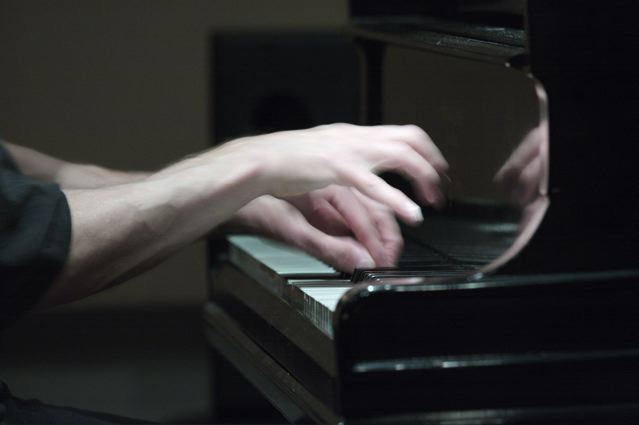
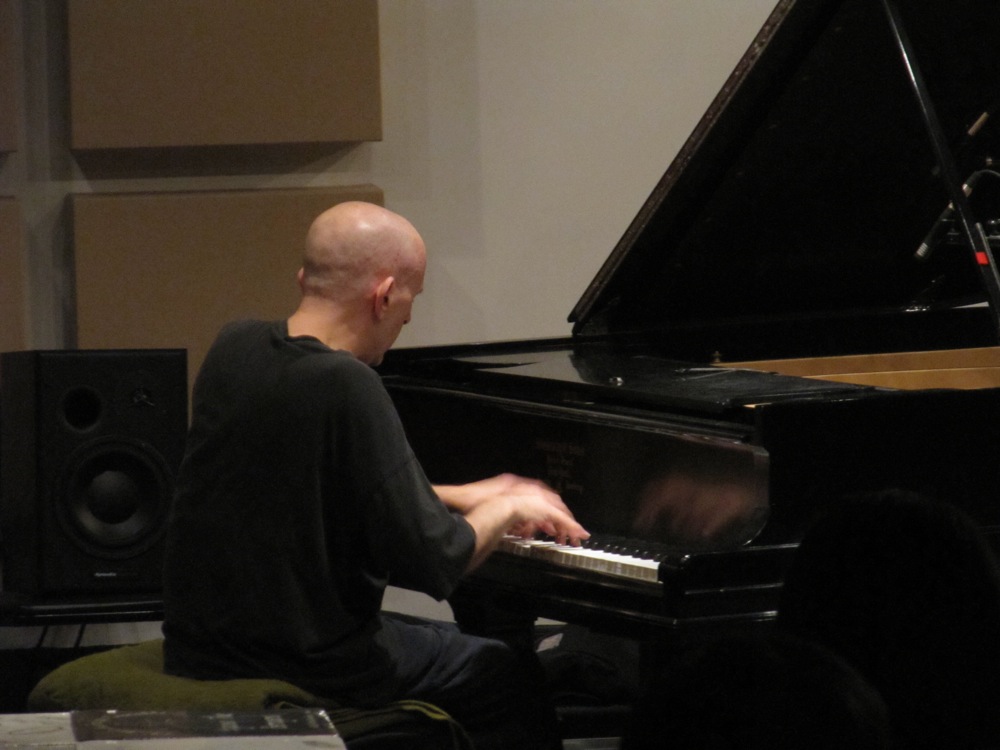
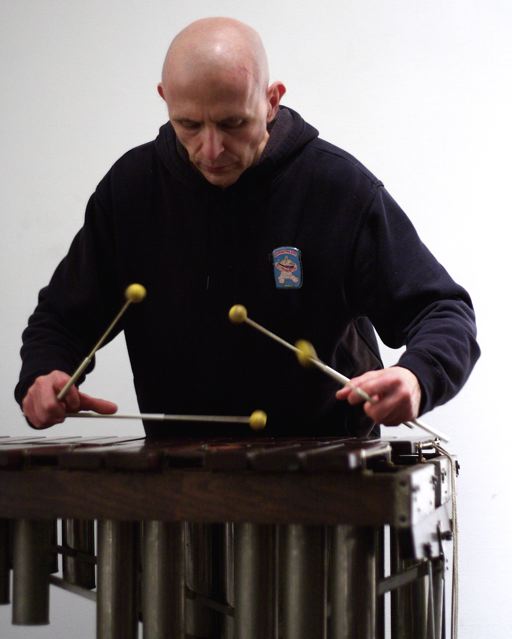
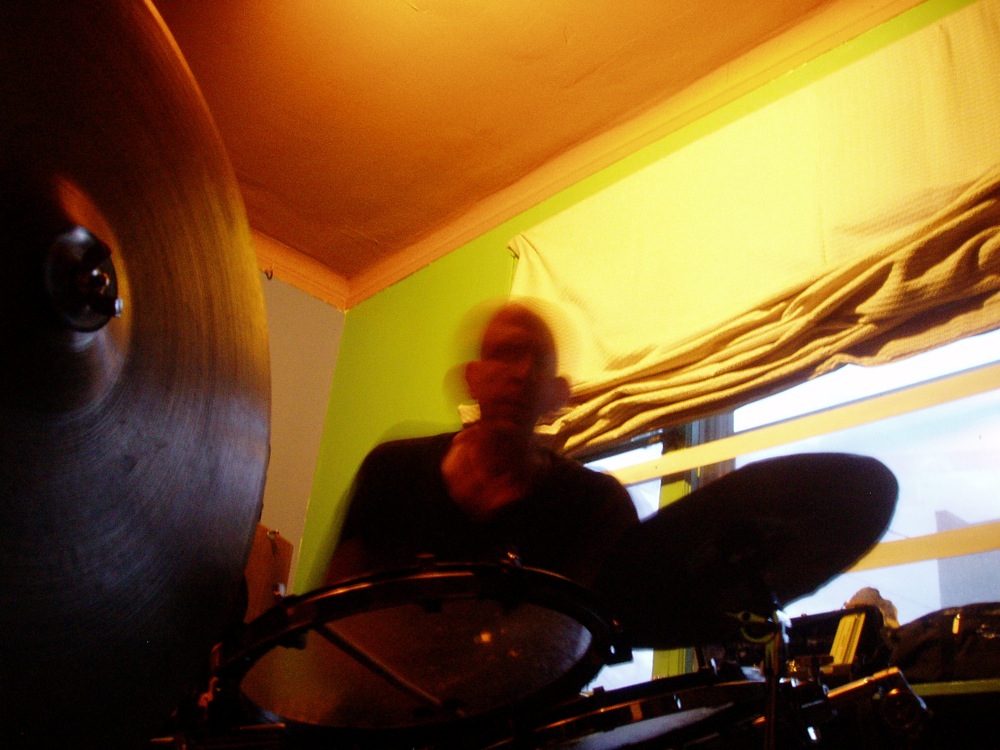
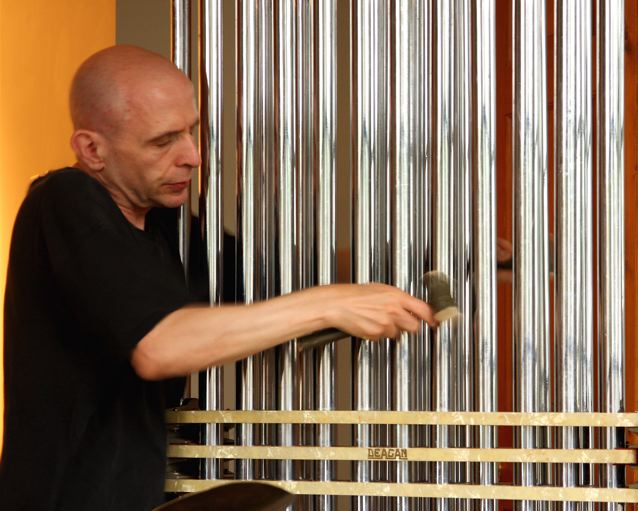
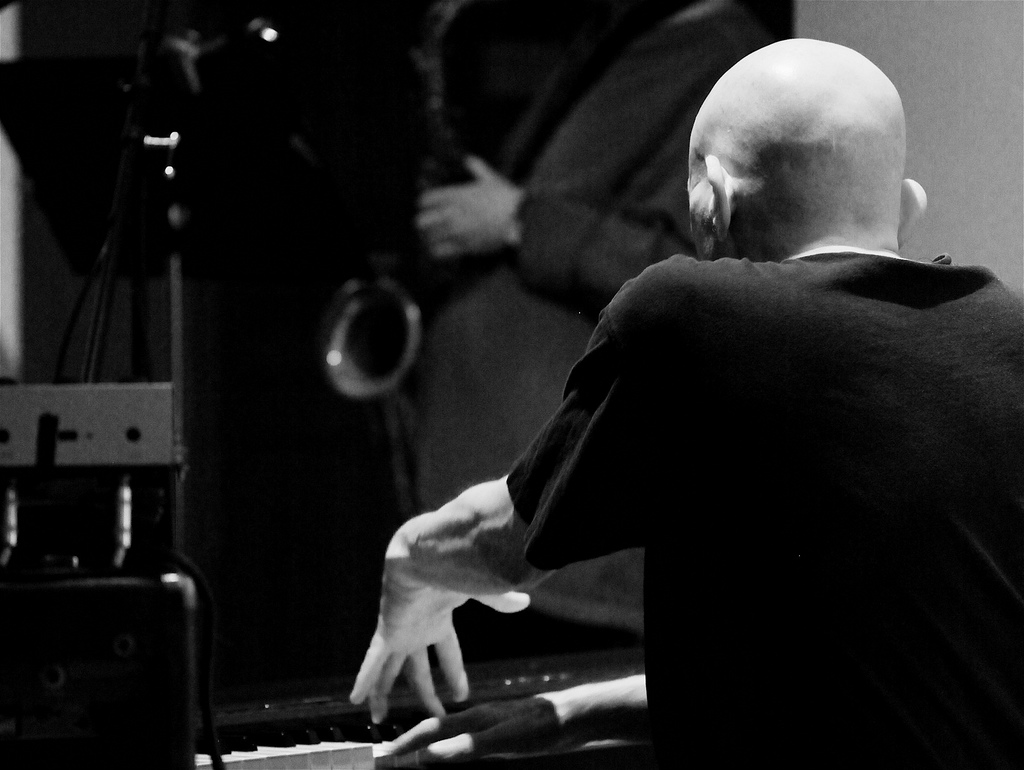
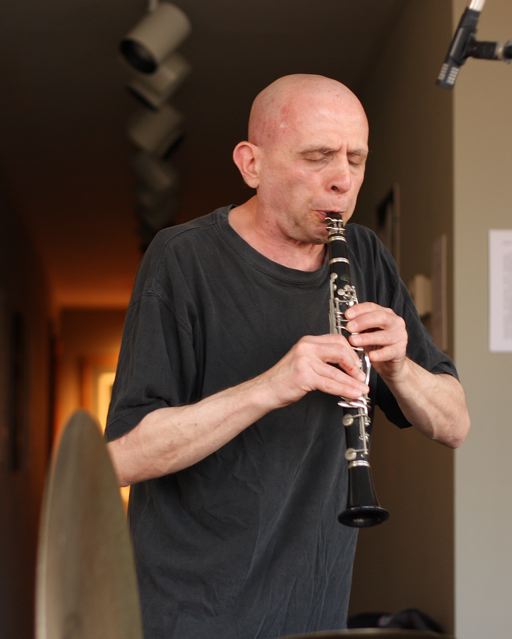
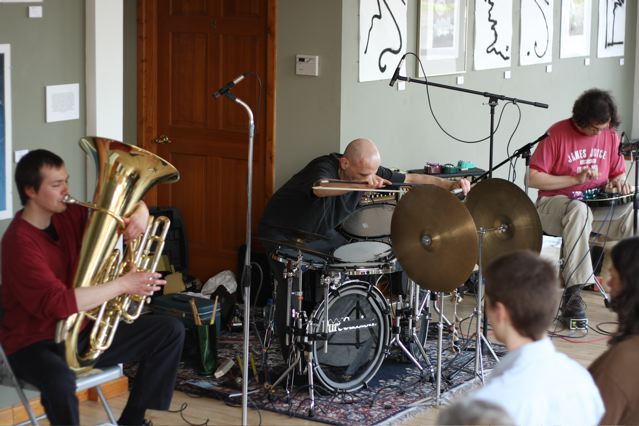
ETHAN IVERSON OF THE BAD PLUS CALLS MILO FINE “the most career-allergic musician on the planet.” Since 1969, Fine has pursued his own path, what he calls his “lifework in free jazz/improvised music; a lifework whose cornerstone has been self-determination.” He advocates “recognition over fame, publicity over hype, support over worship.” That kind of attitude does not lead to contracts with major record companies (or it didn’t, back when such things were available), cover stories in magazines, or lucrative bookings.
Yet Fine lives a life of music — about as improvised a life as it gets. He teaches at the West Bank School of Music, works part-time jobs, and lives frugally in a city-rehabbed house on Minneapolis’ near-north side, carving out as much time for practice as possible. He has made over three dozen recordings. Since 1970, he has produced an ongoing series of concerts at a succession of Minneapolis venues. These days, he performs in alternate months at the Homewood Studios in north Minneapolis with various collaborators and at the West Bank School with the Milo Fine Free Jazz Ensemble.
Self-taught except for informal studies with his father, percussionist Elliot Fine, and a year of piano lessons with James Allen, Fine plays drums, piano, clarinet (B-flat, E-flat, and alto), marimba, orchestra chimes, and m-drums, a percussion kit of his own devising made of found objects. Its successor, m-drums II, incorporates low-tech electronics. Occasionally he brings out a wheel to which he has fastened a set of toy plastic instruments called groan tubes. When he spins it, banshees sing.
________________________________________________________
Pamela Espeland: Along with calling you “career-allergic,” Ethan Iverson has said very nice things about your work, like “Fine seems to have a whole theory of music based on instinct…he sounds like no one else and has technique to burn.”
Milo Fine: Davu [Seru] told me about that, and I was blindsided. It was really lovely. The fact that [Ethan] was able to hear my pianism blew me away. What surprised me was his dealing with someone who’s as far under the radar as I am, because there’s absolutely nothing in it for him. Obviously, if I were truly career-allergic I wouldn’t play in public, and I’d just be working on my stuff on a mountaintop somewhere. But ambivalence and untenability are my watchwords, so there you go. And paradox.
PLE: What happened in 1969 to launch your “lifework in free jazz/improvised music and self-determination”?
MF: I was a teenager playing rock, and I got very disillusioned with how far it would go in terms of exploring potential, in terms of sound and music. If there was a band I liked, usually by their third record I was thinking, “What’s wrong with this?” What I didn’t understand at that point was [the impact of] producers, managers, record companies — the molding thing. Also, I was being exposed to some so-called avant-garde music: avant-garde jazz and contemporary avant-garde classical music. I started hearing sound as sound and thinking, “What could I do with that?”
In 2004, in separate conversations with Anthony Braxton and Bill Dixon, they both looked at me and said, “Milo, do you remember that time when we felt we could change the world?” They were referring to the 60s and early 70s. The optimism we felt then was palpable. I was so grateful — I am grateful — to have started work in this area at a time when things were so open. The arteries hadn’t hardened. The schools weren’t in place. The hierarchy hadn’t been firmly established. All the puppet masters and tastemakers weren’t firmly in place, though they were working on it. Of course, what happens is we don’t change the world, the world changes us. I guess I had an early-on resolve: To the extent that I’m able, I’m not going to let the world change me. That became more and more apparent as my so-called career moved on.
PLE: What do you mean by “self-determination”?
MF: I’m sorry to have to say it, but that’s just Black Nationalism from back in the day. The reason I’m sorry to say it is, being a pasty-faced male, the last thing I want to do is co-opt. What was going on at the time was these so-called radicals in the Black movement were saying, “Fuck whitey, let’s do it ourselves.” You don’t wait for the man to do it, you do it yourself. You take the bull by the horns, and you set things in motion, and you keep them alive, and you rely on yourself.
Today, self-determination has come to be known as “DIY”. All the rockers talk about it, especially the “alternative rockers.” The funny thing about them is — and it’s true of the jazz cats, the improvising music cats, as well — they wear their playing in small, unknown places and putting out their own stuff as a badge of honor; but what they’re hoping is that, one day, they too will be playing the arenas and the major institutions. Particularly because I was approaching it, or fancied myself approaching it, in a more purist way, I thought I’d be making a modest living doing the music by 1979. But that’s not how it works.
PLE: It didn’t happen?
MF: Oh, lord, no, And it makes sense that it didn’t happen, because there were certain things I couldn’t let go of and certain things I just don’t have the appetite for. God bless those who do. I buy my time. I have to work a couple of days a week for money, and the rest of my time is my own. Like Braxton and any number of people have done, you come up with a survival strategy.
PLE: What do you practice? Do you have music in front of you?
MF: Oh, lord, no. I improvise and I play. I cultivate an interface between me and the instrument. I have enough control issues already — I’m not interested in controlling the piano, controlling the drums. I want to find out what’s there and blend with it. For me, a lot of practicing is avoidance of things that are too comfortable. Like: This thing is surfacing a little too much — I’m going to leave that alone for a while. Or: I seem to be relying on that thing too much; I’ll get rid of it. Working the way I do enables or encourages the unexpected to come out, and it can be the damnedest stuff — something Eastern, something medieval, something New Orleans. We’re talking about the collective unconscious. I’ll be playing something and think, “What the fuck was that?”
PLE: How nice to surprise yourself.
MF: That’s it! Otherwise it’s not a living music, it’s a dead music. A lot of improvisers don’t really improvise. They’ve got shtick; they’ve got stuff that they do. They can be really good players, don’t get me wrong. But if you really start shaving it down, when you’re talking about improvising, you’re talking about surprising yourself. I tend to short-circuit myself. If I’m playing and something feels too good, I’ll cut it off mid-stream, because it’s too easy, and it’s not really in service to the music – it’s just me having a good time.
PLE: What does the music demand?
MF: The music demands life. Life, and the implicit death behind it. That it’s alive.
PLE: What is improvisation to you?
ML: It depends on whether you’re talking about improvisation with a form, or improvisation without a form, “free improvisation.” Improvisation with a form would be your jazz improvisation: chords, chord progressions, a time signature, a melody. Improvisation without structure means you’re spontaneously creating a structure. That kind of improvisation is probably best defined as instant composition, or composition in real-time. A composer can sit there and work and erase. Improvisation is more organic and human. You’re exposing your process.
For me, personally, improvisation is playing without conscious preconception. As [John] Coltrane said, it’s starting from zero every day. You start as if all the work you’ve done doesn’t necessarily set you up to get through the next thing, but you’ve got to bring it all to the table. People have an expectation that improvisation is all call-and-response, that it’s “you do this, I’ll do that,” or “I’ll match you,” or “I’ll anticipate you.” That bores the shit out of me.
________________________________________________________
It’s all about what you bring to the music, whether you’re playing an old tune or whether you’re freely improvising. What are you going to do with it? And is it as serious as your life? Are you going to put it all on the line or not?
________________________________________________________
PLE: What goes through your head when you’re improvising?
MF: Everything from transcendence, because I’m so involved with the sound, to thinking about what’s going on with the music, to thinking about…name any banal thing, and it will pop into my head. It’s all in flux. All these layers of consciousness, the minutiae of life, the personal struggles flit by. From the ridiculous to the sublime and back again, and inside-out. There’s also a certain focus or concentration that comes from years of playing. Years ago, I thought, I don’t really play music. I’m just being, I’m just living, and music is the activity I’m engaged in.
PLE: Charles Mingus once said, “You can’t improvise on nothing. You gotta improvise on something.” What do you improvise on?
MF: You improvise on the first thing you play. You sit down, and you’re playing, and there you are. You’re in it. There’s no going back. You’ve begun. You can’t start with nothing, because there’s never nothing — there’s always something. Having a preconception or not having a preconception does not make for good or bad music. It’s what you bring to it, whether you’re playing an old tune or whether you’re freely improvising. What are you going to do with it? And is it as serious as your life? Are you going to put it all on the line or not? [Mingus] was just being silly.
PLE: One reviewer wrote that your music requires “special listening tools.” What are some listening tools a person might bring to one of your performances?
MF: An open mind. A lack of expectation. Lord, we carry so much baggage. And we’ve been conditioned by our culture to have certain expectations — what is music, what is art — and we bring that to everything we experience. Our brains are equipped to make order out of so-called chaos. I say “so-called chaos” because chaos is simply order we’re unable to perceive. If you come to an improvised music concert and you’re open to the sounds, to the fact that these are not necessarily going to be traditional sounds, you’ll find forms appearing. When we play, there’s no talking down to the audience. I realize for a lot of folks it’s a step into deep water. But to do it any other way would be insulting to us and to anybody who’s even mildly curious about what really goes on. When you’re playing at your highest level, you anticipate that people are going to be willing to take the journey with you.
PLE: How can someone learn to tell the difference between good improvisation and bad improvisation? They can sound a lot alike.
MF: It is definitely a matter of exposure. The more you’re exposed to it, the more nuanced your reactions become. All sorts of things start to become more clear, though they don’t have to be analyzed to death. If you’re not buying the image or the marketing thing, and you’re listening as openly as possibly, then why not trust your gut feelings?
PLE: Who are you listening to? Who have you learned from in your own listening?
MF: I don’t talk about people I listen to or about influences, because if you do, you run the risk of two things: Either you talk about all the people that everybody talks about, the pantheon; or, you start bringing up all the arcane people, showing how hip you are. A lot of people, frankly, have let me down. Something that really concerns me is maintaining. I look at cats who are getting older, and some of the choices and decisions that they’ve made, and I just keep using that as life lessons. Like, man, if I get to be that old, I don’t want to make a decision like that.
PLE: I’ve heard it said that you don’t really care whether people like your music or not. I’ve been at performances where people have walked out. Do you care?
MF: Of course I do. I’m a well-conditioned kid, or at least a man who was well-conditioned as a child. So, yeah, I care — but I get it.
PLE: I’ve also heard it said that you’re so oblivious you don’t even notice.
MF: I’m absolutely not oblivious. I feel bad. But I realized a long time ago that there’s nothing I can do. I can’t grab someone by the lapels and say, “Didn’t you hear that? Didn’t you get this?” I’m sorry we didn’t connect. Maybe a seed is planted, maybe not, but there’s nothing to be done about it. I can’t sacrifice those feelings and thoughts and ideas I started having in 1969, just because I want to keep an audience member or two. That would be a betrayal of myself and what I’m trying to do. I don’t mind if people plug their ears when I play the clarinet. If the volume or frequencies are irritating, then plug your ears, for God’s sake!
________________________________________________________
Related performances:
Milo Fine curates and appears in the Improvised Music at Homewood Studios series of concerts on the second Monday of every other month. The Milo Fine Free Jazz Ensemble appears at the West Bank School of Music on the first Friday of every other month. See a complete schedule here.
Fine’s recordings, including his latest, The Untenability of Sentience & More Wistful Tunes for the Sincere, with Steve Gnitka on guitar, Charles Gillett on guitar, Scott Newell on tenor sax and voice, and Stefan Kac on tuba (2009, Shih Shih Wu Ai Records), are available at his performances or direct from Fine. Find a discography and more information here.
________________________________________________________
About the author: Pamela Espeland writes about jazz for MinnPost.com, blogs about jazz at Bebopified, and keeps a Twin Cities live jazz calendar.